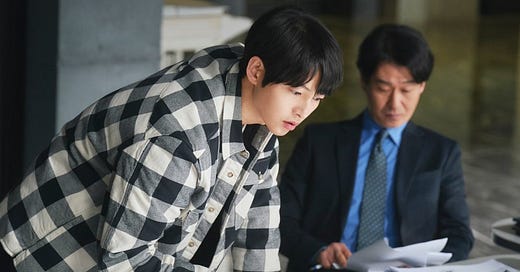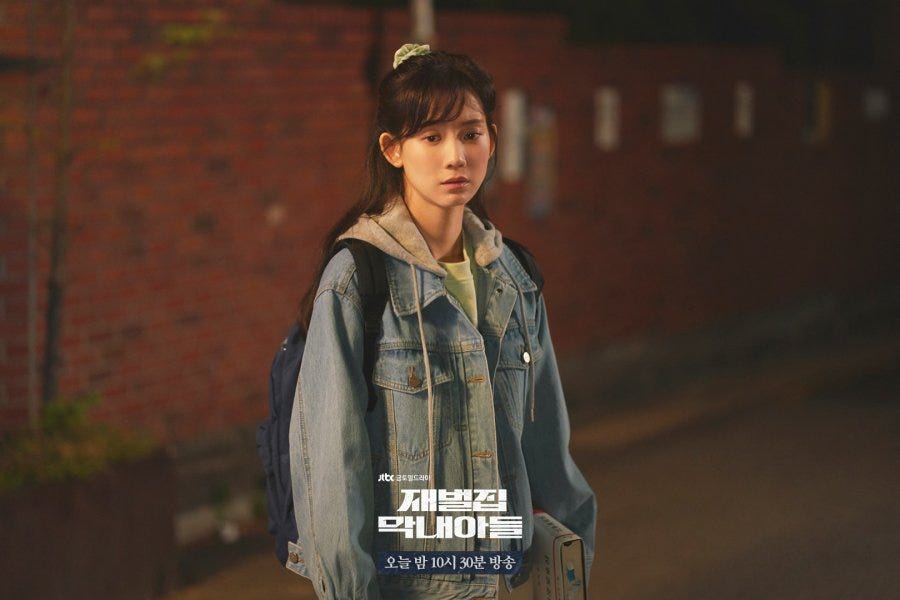Reborn Rich (2022) Episodes 1-8
As someone who has lived through of the global economic upheavals of the late 1980s to the 2000s, it’s been fascinating to have my horizons broadened with this South Korean perspective. Although superficially this show purports to be one of those family dramas where unworthy offspring battle over the succession of the family business, it is at its core a coming-of-age story. Song Joong-ki’s Jin Do-jun (formerly Yoon Hyeon-woo) might be an old soul but in his current persona, he has to re-navigate family dynamics in a different context and make sense of his own identity. He is no longer the oldest son of a struggling working class family, a former slave to the whims of the Jins owners of Soonyang Group. Instead he has regressively reincarnated as the youngest grandson of Soonyang’s founder, Jin Yang-cheol (Lee Sung-min). Until Episode 7, he suffers an internal tug-of-war about where his loyalties ultimately lie. Even while he’s presently a blood relative, he cannot presume to exist on equal terms with his uncles, aunt and oldest cousin with the same access to the family coffers. Especially as his father was born out of wedlock and then angered the old man when he insisted on marrying an actress. Hence he is still positioned as the outsider who has access to the inhouse bickering. Although he has all the memories of his previous self at his disposal, he is born into a new battleground with a new set of rules with a new identity that he has to develop afresh. Jin Do-jun grows up far too quickly and establishes himself as a shrewd and uncanny investor even as a child. He can lose no time in impressing the family patriarch, Jin Yang-cheol, and stake his claim on the family enterprise. Challenging the status quo is the first step in his larger revenge plan against this dysfunctional clan that was in all likelihood responsible for his untimely death, putting an abrupt end to his previous life.
There’s been a lot of talk around the web about whether or not the romance is necessary in this show. Frankly, it’s the wrong question. The question should be why the showrunners insist on having what’s often been called a “loveline” between those two. Do-jun’s dynamic with Min-yeong which begins in his previous timeline (as I like to think of it) is important because a) she’s a link to the past as someone who set herself in opposition to Soonyang Inc and all that the company stands for; and b) of a tug-of-war raging within Do-jin who longs for real intimacy with a woman he genuinely likes who is not part of his machinations. While he knows he cannot have vulnerabilities which can be exploited by others in the game that he’s playing which does include revenge, what’s really holding him back is knowing that he will inevitably hurt her because of his schemes. Or worse still, drag her into the gutter with him. What’s more because of his plans to take down members of his extended family, he’s convinced himself that he doesn’t deserves any kind of happiness. In these rare moments where we are privy to his heart — trips to the cafe where Min-yeong is working, pretending it’s not about her — we know that he has the same basic needs as the next guy. Yes, on the surface he’s positioned himself as an investment prodigy but deep down there’s a part of him that craves simplicity and normality. Regardless of whether there’s chemistry between Song Joong-ki and Shin Hyun-bin. Or whether Min-yeong as a character is attractive to the audience, this is about Do-jun’s characterization as an antihero. Furthermore, he already knows from the previous timeline that she’s a courageous and righteous prosecutor who does her job to the uttermost. That’s part of the attraction.
That brings me to his brief brush with Hyun-min who goes on to marry his cousin Seong-jun. Why didn’t he succumb to her charms and to the carrot she dangled under his nose? It’s practically the same thing. He would not be free to do what he really wants to. She would potentially be a hindrance to his scheming. But from the opposite end. She will always have her own agenda and he will never be sure of her. There’s a huge price tag for collaborating with her. One in which he’s unwilling to outlay. Moreover Do-jun is a soul who remembers his working class roots. Cunning spoilt rich women are not his cup of tea. He’s had his fill of them working as a willing slave to the Sooyoung tribe. Therefore relationships with women are difficult for him one way or another. As far as he’s concerned, they can be a help or a hindrance.
In recent days Jin Yang-cheol has torn up and thrown the long-standing primogeniture succession plan into the waste paper basket. It’s no longer the oldest son or oldest grandson who automatically get to sit on the throne but the patriarch has stipulated that the one who takes the company to new heights is the one who gets to be its owner. The visionary chairman of one of the country’s economic powerhouses laments over the fact that his progeny lack his business acumen and entrepreneurial spirit. After a conversation with his long-standing rival and friend, the chairman of Daeyoung, he comes to the conclusion that none of his children take after him except the ambitious youngest grandson who up to now has been excluded from having a shot at the prize because of his father’s birth origins and determined decision to marry an actress. Jin Yang-cheol knows he’s living on borrowed time so his priority (more than the happiness of his children) is to leave his beloved Soonyang in the best hands possible.
It makes sense. Certainly from a business point of view. But of course not everyone sees it that way because as blood relations they feel entitled to pieces of the pie their father or grandfather made from scratch because of his insatiable ambition. Jin Yang-cheol’s change of heart on the succession issue repudiates those claims. First of all, genetics don’t automatically guarantee business savvy. In fact, what often does result is complacency and all the kinds of emotional baggage that come with having too much conspicuous consumption in the brain. All the grooming in the world can’t erase entrenched character flaws. Secondly, progeny may see the company as a cash cow rather than a legacy to grow for the next generation. Jin Yang-cheol is a builder by nature and instinct. For him Soonyang’s future viability comes from prudent expansion. His children, on the other hand, seem only interested in living in the house and enjoying the perks of being their father’s children. Jin Yang-cheol is an engine builder whereas his offspring is only interested in milking the engine for their own benefit. It’s not unusual and certainly not beyond the pale because the man who founds a business is usually a visionary — and visionaries are rare as rare can be.






